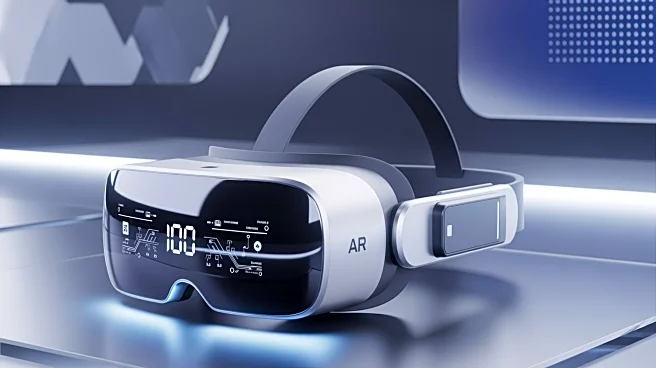What's Happening?
Meta has announced the release of its new Ray-Ban Display, a pair of augmented reality glasses priced at $799, featuring a 6-hour mixed-use battery life. The glasses, which include a built-in 12MP camera
and wristband control, will be available at major U.S. retailers such as Best Buy and LensCrafters starting September 30, 2025. This marks a significant shift from prototype demonstrations to mass retail availability, indicating Meta's move to bring augmented reality into everyday consumer use. The Ray-Ban Display is positioned as a premium product compared to cheaper alternatives that offer only camera functionality.
Why It's Important?
The introduction of the Ray-Ban Display by Meta is poised to reshape the augmented reality market by making AR technology more accessible to mainstream consumers. The $799 price point and retail availability could drive wider adoption, offering consumers a tangible choice between advanced AR features and more affordable options. This development is likely to influence consumer behavior, with early adopters potentially embracing the hands-free navigation and app integration capabilities. Additionally, the retail presence of such technology may prompt discussions on privacy and regulatory measures concerning wearable cameras.
What's Next?
As the Ray-Ban Display hits shelves, consumers will face decisions regarding the trade-offs between price and functionality. Early adopters may prioritize the advanced features, while others might wait for longer battery life or lower-priced alternatives. The retail availability is expected to accelerate trials and potentially broaden the appeal of AR technology. Furthermore, the rollout may lead to increased scrutiny and debate over privacy policies related to wearable cameras, as these devices transition from developer circles to public use.
Beyond the Headlines
The widespread availability of the Ray-Ban Display could lead to significant cultural and ethical discussions about the use of always-on cameras in public spaces. Privacy advocates have already raised concerns, and the technology's integration into daily life may necessitate new regulations and societal norms. The success of this product could also drive innovation in app development, particularly in areas like location-based services and fitness tracking, as developers gain access to a larger user base.









